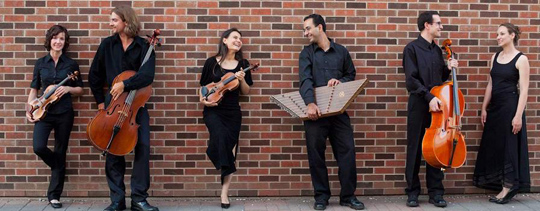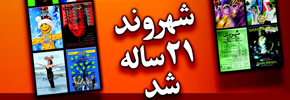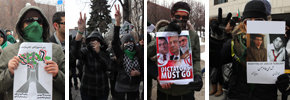Sima Sahar Zerehi – Should music always be easy on the ears? Should it fade into the background like elevator tunes dulling crowd sounds in the shopping mall? Should it lull us into the recesses of our memories recalling nostalgic images of days gone by? Should music be indulgent and pliable? Should it satisfy our cravings like a sugary slice of birthday cake?
Or can music stimulate the mind? Can it grate on us with new unfamiliar sounds that demand our attention and focus our intellect with their innovative compositions? Is there room for new music in our community?
These are the questions that come to mind when discussing Baarbad Ensemble’s upcoming performance at Harbourfront’s Tirgan Festival with one of its two founders Mehdi Rezania.
“I think, especially among the Iranian community, it’s a great challenge, if you come up with a new composition and it has no vocals it is usually not accepted,” laments Rezania, an accomplished santur player and innovative composer. “You have to learn to work within the limit of your community if you want to be accepted and popularized.”
Rezania is a thinking person’s musician; he pursues his love of music from both a practical as well as a theoretical perspective. While not neglecting his engineering degree, as expected from a proper young Iranian man, he also continued his musical education.
Like many accomplished musicians Rezania began his training in santur at a young age. At thirteen he studied under Bahman Nowruzi and Mohammad Rasuli and drew his early inspiration from the works of Master Parviz Meshkatian.
After receiving his early training he continued his studies independently working from available tapes and notations. For Rezania music was not merely about mastering the classic instrument within the confines of traditional tropes but also about creativity and innovation. As such, he became inspired by the work of Master Ardavan Kamkar and studied the advance level of santur under his tutelage.
After immigrating to Canada with his family Rezania continued his studies at York University, this time pursuing a major in psychology and a minor in music. Currently, he is finishing his bachelor of music with a focus on composition.
While his thesis is based on various styles of santur playing with an emphasis on the works of Master Ardavan Kamkar, he has also taken interest in the folklore music of Cuba and West Africa.
These divergent interests and openness to new forms of music is at the core of Rezania’s philosophy towards musical composition.
In 2004 Mehdi Rezania and Toloe Roushenas founded Baarbad Music. The husband and wife team’s aim was to produce a unique artistic sound that combined elements of both Western and Eastern classical music.
Rezania notes, “the two main Persian instruments are tar and santur, the main instruments of Western classical music are violin and violoncello, in Baarbad Ensemble we put these four together plus one percussion and one vocal to get a new sound.”
While Rezania has been able to successfully build an audience for Baarbad Ensemble, making the group a staple at most Iranian community functions and events -including the recent Iranian Heritage Day at the Royal Ontario Museum – he still struggles with introducing the community to his more innovative compositions.
“For Iranians when you have a composition without vocals its hard to sell tickets or distribute your music,” recounts Rezania.
“Most of the popular Iranian musicians in every genre are singers, their music is based on the poetry,” he adds.
“For myself music is a very independent art, it can be matched to poetry but it shouldn’t always be an explanation of poetry. It has to have its own values without the accompaniment of any other art form,” explains Rezania.
Rezania admits that audiences outside of the Iranian community are more receptive to his new works. “Outside the Iranian community there’s much more freedom,” comments Rezania.
In speaking about why he believes non-Iranians are more open to new forms of music, Rezania notes, “I think that they have listened to broader genres of music.”
He adds, “for people raised in places like Canada music hasn’t been anything that has been against their religion or beliefs. The audience in most Western countries appreciate any new artistic creations, you don’t have to limit yourself as much. There are limitations but they are less than when it comes to the Iranian community.”
Rezania is realistic about the restrictions of producing innovative works. He states, “The truth is today musicians’ works are determined by funding, if you have to write a symphony you have to think about whether you can sell tickets to the concert. Of course this was also true in the time of Mozart and Beethoven in some way because they had supporters who funded their work.”
Rezania disparages that music has lost its intellectual weight for some audiences. “Much of great music has to be somehow entertainment,” muses Rezania, “especially in our community, for example folklore music is getting great popularity. Folk music is very rich but nobody can say that it is as artistic as classical music.”
In speaking about supporting artistic innovation in the community, Rezania states, “When an organization or group has funding to support art and culture it’s important not to just showcase it. If they have good funding and support it’s perhaps better to support the artistic values more than the popularity of the programs.”
He notes that audiences need to be exposed to new works in order to build an appreciation for them.
“People have to hear it first, if people don’t hear it, they will never get accustomed to the new styles,” explains Rezania. “Every innovation happens like a strange thing, first it may not be accepted, but as you hear it more you will feel better and appreciate it.”
In speaking about Tirgan Rezania admits that he wishes that a few of his favourite composers could have been included in the program.
“A couple of good composers in Iran who are very strong in their work are Siamak Aghaei and Mohammad Reza Fayaz,” offers Rezania.
“Fayaz is doing a great job in composition,” states Rezania. “He is very critical to many people and his music is not heard by many in Iran. He doesn’t accept many norms that have been accepted in Iran, that’s why his work is not as popular.”
“Aghaei is one of the best students of Meshkatian. He works with various santurs and he’s now famous in Iran. For the first time he created an ensemble made of five santur players,” explains Rezania and adds, “He even worked with Yo-Yo Ma. He has new ideas and creates new music but based on the roots of classical music – he’s innovated Persian music.”
In speaking about Baarbad Ensemble’s program at Tirgan, Rezania admits that the festival organizers amended his initial proposal in order to showcase the classical and folkloric music of Iran.
“When we saw Tirgan was coming we applied to perform a different program but they contacted us and wanted us to change our program to something else,” recounts Rezania.
“We wanted to perform my own composition for six string instruments, one santur, and a vocal – I had worked on it for a year – it was my project for music composition at York University,” explains Rezania. “But they wanted to highlight the classical move.”
While Rezania may be unable to perform his ideal program at Tirgan, he nevertheless acknowledges the festival’s value.
“Tirgan is very helpful, especially for Iranians outside Iran and Iranians in Canada,” notes Rezania, “by promoting the artistic works of the Iranian community Tirgan shows the world a different image of our country.”
He adds, “When it comes to Iran, there’s tension – politicians on both sides like to put more stress on these internal and external pressures – a festival like this shows our people as artistic and cultured, this is a different vision of being Iranian than what you get on the news.”
__________________________________________________________________________________
Baarbad ensemble will be performing a free concert at Tirgan Festival at Harbourfront on Sunday July 24 at 5pm at the Redpath Stage. You can also purchase Mehdi Rezania’s recently released CD Salute To Sun at various Toronto Iranian bookstores.






